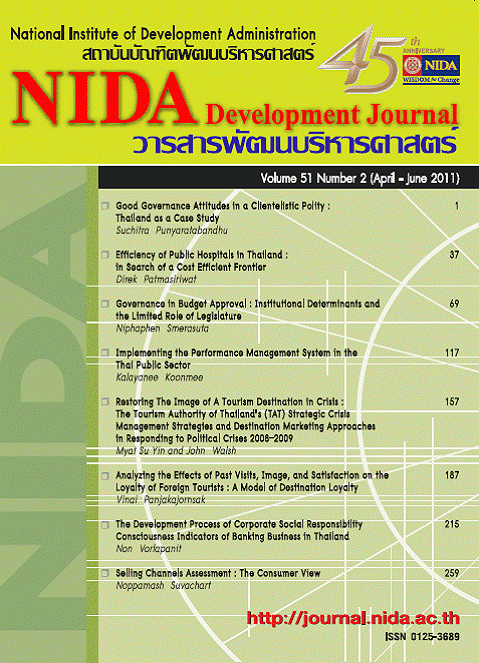Good Governance Attitudes in a Clientelistic Polity:Thailand as a Case Study ธรรมาภิบาลในสังคมระบบอุปถัมภ์: การสำรวจทัศนคติของประชาชนในประเทศไทย
Keywords:
Good Governance, Attitudes, Clientelistic Polity, ThailandAbstract
Behavioral norms in clientelist political systems such as Thailand may run counter to the good governance paradigm which assumes the existence of a democratic, egalitarian, pluralistic, and participatory society. This article presents survey findings on citizen attitudes toward four dimensions of governance: rule of law, accountability, transparency, and participation. The findings are based on a probability sample of 3,033 respondents drawn from 19 provinces in the north, northeast, central and south regions of Thailand (excluding Greater Bangkok). The findings indicate that while Thai citizens are on the whole supportive of the notion of good governance, support varies for the different dimensions. The transparency dimension received the greatest support, followed in successive order by rule of law, accountability, and participation. Significant regional variation exists. The northeast region ranks last on the composite governance scale as well as on many governance dimensions. Implications for dissemination of information and initiatives to raise public awareness are suggested.
ลักษณะทางพฤติกรรมในสังคมที่มีระบบการเมืองแบบอุปถัมภ์เช่นกรณีประเทศไทยนั้น อาจมีลักษณะที่ตรงข้ามกับหลักการธรรมาภิบาล ที่มีแนวคิดสนับสนุนต่อหลักการประชาธิปไตย หลักความเสมอภาค หลักเสียงข้างมาก และหลักการมีส่วนร่วม ซึ่งบทความฉบับนี้ได้นำเสนอผลการสำรวจทัศนคติของประชาชนต่อหลักธรรมาภิบาลใน 4 มิติ ประกอบด้วย หลักนิติธรรม หลักความโปร่งใส หลักความรับผิดชอบ และหลักการมีส่วนร่วม ศึกษาโดยวิธีสำรวจด้วยกลุ่มตัวอย่าง 3,033 คน จาก 19 จังหวัดในภาคเหนือ ภาคตะวันออกเฉียงเหนือ ภาคกลาง (ไม่รวมกรุงเทพมหานครและปริมณฑล) และภาคใต้ ผลการศึกษาพบว่า กลุ่มตัวอย่างมีทัศนคติสนับสนุนต่อหลักการธรรมาภิบาลโดยรวม ทั้งนี้ เมื่อจำแนกรายมิติพบว่า มีความแตกต่างกัน กล่าวคือ กลุ่มตัวอย่างมีทัศนคติสนับสนุนต่อหลักความโปร่งใสมากที่สุด รองลงมาได้แก่ หลักนิติธรรม หลักความรับผิดชอบ และหลักการมีส่วนร่วม ตามลำดับ นอกจากนี้กลุ่มตัวอย่างที่อาศัยอยู่ในแต่ละภาคยังมีระดับทัศนคติที่แตกต่างกัน กล่าวคือ กลุ่มตัวอย่างในภาคตะวันออกเฉียงเหนือจะมีทัศนคติที่สนับสนุนต่อหลักการธรรมาภิบาลโดยรวมและจำแนกรายมิติทั้ง 4 มิติ ในระดับต่ำที่สุดเมื่อเปรียบเทียบกับภาคอื่น ๆ จากผลการศึกษาดังกล่าวจึงนำมาสู่ข้อเสนอแนะใน 2 ประเด็นที่สำคัญ ได้แก่ การเพิ่มความสำคัญของการเผยแพร่ข้อมูลข่าวสารแก่ประชาชน และการสร้างความตระหนักของสังคมโดยรวมต่อธรรมาภิบาลให้เพิ่มมากขึ้น





